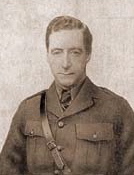Cathal Brugha

Born in Dublin, Ireland of mixed Irish Catholic and English Protestant parentage, Brugha was educated at the Jesuit Belvedere College, not by the Irish Christian Brothers who educated most of the insurrectionists and guerrillas, but was forced to leave at the age of sixteen due to the failure of his father's business. Brugha went on to become a clerk with a church supplies firm.
In 1899 Brugha joined the Gaelic League and in 1913 he became lieutenant in the Irish Volunteers. During the Easter Rising in 1916 he was second in command at South Dublin Union under Commandant Eamonn Ceannt. During the fighting he was severely wounded by a hand grenade, as well as by multiple (perhaps 16) gunshot wounds, and was originally not considered likely to survive.In October 1917 he became Chief of Staff of the Irish Republican Army (IRA) and held that post until March 1919. In 1918 he was elected to Dáil Éireann representing Waterford and he soon became Minister for Defence. Due to the absence of Éamon de Valera and Arthur Griffith, Brugha presided over the first meeting of Dáil Éireann on the 21 January, 1919.
He was known for his bitter enmity towards Michael Collins, who, although nominally only the IRA's Director of Intelligence, had far more influence in the organisation as a result of his position as a high ranking member of the Irish Republican Brotherhood, an organisation that Brugha saw as undermining the power of the Dail and especially the Ministry for Defence. At a top-level IRA meeting in August 1920, Brugha argued against ambushes of Crown forces unless there was first a call to surrender, but this was dismissed as unrealistic by the brigade commanders present. Brugha also had the idea of moving the front line of the war to England, but was opposed by Collins.
During the Easter Rising, he was the second officer commanding troops at the South Dublin Union, under Éamonn Ceannt and received fourteen wounds. In 1918, he was elected to the First Dáil for Waterford County and was appointed Minister for Defence. In the absence of Éamon de Valera, who was in prison at the time, Brugha was elected President of Dáil Éireann at the first convening of Dáil Éireann on the 21st January 1919, a post he held for only four months. In the meantime, Brugha was highly active in recruiting, drilling and training members of the newly-formed Irish Republican Army, the successor to the Irish Republican Brotherhood. In the 1921 General Election Brugha was re-elected to the Dáil unopposed for Waterford - Tipperary East and was that winter nominated to the Treaty Delegation to negotiate the terms of the Anglo-Irish Treaty in LoNdon with the British government, but refused to go and immediately condemned those who went in his stead and the Treaty they signed, for which he was sacked as Minister for Defence.
On 7 January 1922 Brugha voted against the Anglo-Irish Treaty. During
the Treaty Debates he pointed out that Collins only had a middling rank
in the Department for Defence which supervised the IRA, and yet the
newspapers were hailing him as 'the man who had won the war'. Brugha
was one of the 57-strong delegation who walked out of the Dáil
rather than accept the Treaty and took the anti-Treaty side in the
Civil War. He left the Dáil and was replaced as Minister for
Defence by
Richard Mulcahy.
On the outbreak of the Irish Civil War on 28 June 1922 he joined the anti-Treaty side, which had occupied buildings in O'Connell Street. In the first week of July Free State forces commenced shelling of the anti-treaty positions. Most of the anti-treaty fighters under Oscar Traynor escaped from O'Connell street when the buildings they were holding caught fire, leaving Brugha in command of a small rearguard. On 5 July he ordered the his men to surrender. He then approached the Free State troops, brandishing a revolver. He sustained a bullet wound to the leg which 'severed a major artery causing him to bleed to death'. He died on 7 July, 1922, just 11 days before his 48th birthday.
His wife, Caitlín, and son Ruairí both served as TDs after his death. His son, Ruairí Brugha (1917–2006), later became a Fianna Fáil politician and was elected to Dáil Éireann in the 1973 General Election.
Sources:
http://www.politics.ie/wiki/index.php?title=Cathal_Brugha
http://www.answers.com/topic/cathal-brugha